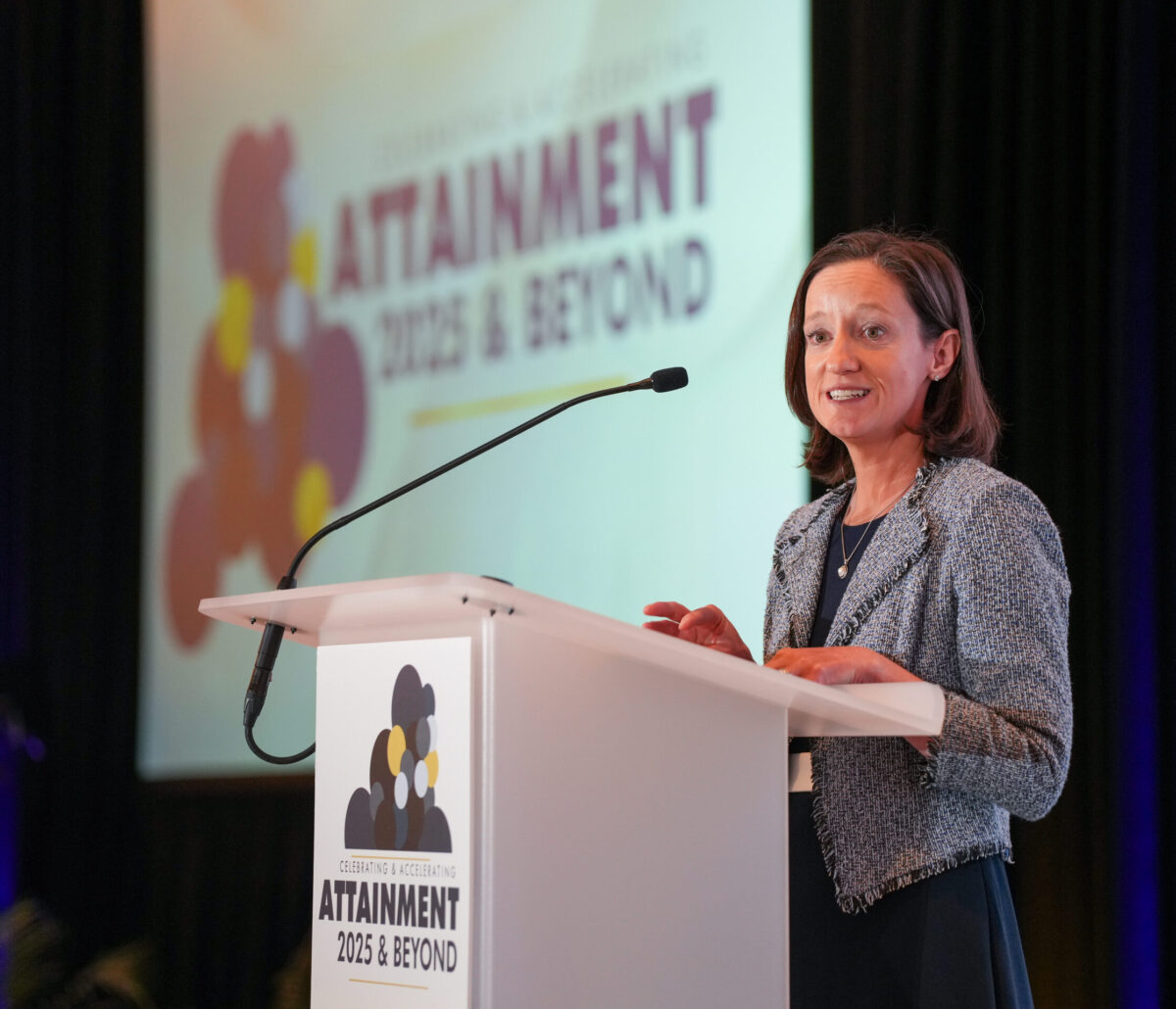PostsecData Comments on Field Test to inform 2020/25 Beginning Postsecondary Students Longitudinal Study
Published Nov 06, 2023
Washington, DC (November 6, 2023) – The Postsecondary Data Collaborative sent comments to the U.S. Department of Education’s National Center for Education Statistics (NCES) regarding the proposed 2020/25 Beginning Postsecondary Students (BPS:20/25) Field Test, which will inform the full-scale data collection for that longitudinal survey. The Beginning Postsecondary Students Longitudinal Study is currently the only nationally representative data source on first-time students’ experiences during and after postsecondary education and is a critical resource for understanding student retention, persistence, completion, and post-college outcomes, as well as systemic disparities in students’ postsecondary access and success. The letter, signed by 11 members of the Postsecondary Data Collaborative, urges NCES to: 1) refine measures of respondents’ perception of the value of their education; 2) maintain and expand questions about borrowers’ repayment experience; and 3) remove questions related to the Biden-Harris debt relief plan. The letter also urges the Department to continue refining longitudinal data collections to ensure the information generated is as relevant and useful as possible, while minimizing survey burden to respondents and institutions.
Read the full letter below.
__
November 6, 2023
Stephanie Valentine
PRA Coordinator, Strategic Collections and Clearance
Governance and Strategy Division, Office of Chief Data Officer
Office of Planning, Evaluation and Policy Development
National Center for Education Statistics (NCES)
400 Maryland Ave
Washington, DC 20202
Docket No.: ED-2023-SCC-0157
To whom it may concern:
This letter is submitted on behalf of the 11 undersigned members and partners of the Postsecondary Data Collaborative (PostsecData) in response to a call for comments on the proposed 2020/25 Beginning Postsecondary Students (BPS:20/25) Field Test, which will inform the full-scale data collection for that longitudinal survey. PostsecData is a nonpartisan coalition of organizations committed to the use of high-quality postsecondary data to improve student success and advance educational equity.
The undersigned members appreciate this opportunity to comment on revisions to the BPS:20/25 Field Test, conducted by the U.S. Department of Education (ED)’s National Center for Education Statistics (NCES). This longitudinal survey is currently the only nationally representative data source on first-time students’ experiences during and after postsecondary education. BPS:20/25 is a critical resource for understanding student retention, persistence, completion, and post-college outcomes, as well as systemic disparities in students’ postsecondary access and success.
To further enhance the utility of this data collection, we recommend that NCES implement the following changes to the proposed field test: 1) refine measures of respondents’ perception of the value of their education, 2) maintain and expand questions about borrowers’ repayment experience, and 3) remove questions related to the Biden-Harris debt relief plan. In addition, PostsecData applauds NCES for the proposed addition of survey questions on disability status and questions measuring the costs and reasons for pursuing professional certifications and state/industry licenses.
1. Refine measures of respondents’ perceptions of the value of their education.
By surveying students directly, BPS:20/25 can collect subjective information, including students’ perceptions of the value of their education. These responses can supplement measures like earnings and employment after college. For this reason, PostsecData strongly supports the inclusion of survey questions measuring respondents’ perceptions of the value of their postsecondary experience (B25BDEGVALUE).
However, PostsecData recommends adjusting the question structure to provide more context on students’ responses. Currently, the proposed field test asks: “Compared to when you first enrolled, are you more or less confident in the value of your undergraduate education?” Without an assessment of students’ initial perceptions, the responses to this question will be difficult to understand. To address this, PostsecData recommends the BPS:20/25 Field Test ask respondents, “How confident are you in the value of your undergraduate education?” in addition to asking respondents to compare their perception to when they first enrolled. If an additional question is not feasible, NCES should revise the current question wording to focus on respondents’ confidence in the value of their undergraduate education, rather than in comparison to when they first enrolled.
2. Maintain and expand questions about borrowers’ repayment experience.
PostsecData supports the addition of questions assessing borrowers’ experiences with loan repayment, as well as the usefulness and availability of existing supports. With the end of the pandemic-related pause on student loan payments and interest, millions of student loan borrowers have already begun to resume repayment, and many are making payments on their loans for the first time since leaving school. Because the BPS study tracks first-time students, it will include respondents who are navigating repayment for the first time, which creates a crucial opportunity to understand how these borrowers are supported through the repayment process.
The proposed BPS:20/25 Field Test includes questions on whether respondents received help from their spouse/family, friends, employers, student loan servicers, and/or college financial aid counselors when determining which repayment plan to select, as well as whether they’d turn to those sources for advice if they were struggling to make payments. The proposed questions also ask respondents whether they received clear and helpful communication about repayment, could easily find out their total balance owed, and could pay all their bills and other essential expenses.
PostsecData supports the addition of these questions and recommends administering them to all borrowers, not just those in active repayment. Borrowers with loans in deferment, delinquency, and forbearance may have vastly different experiences navigating repayment than borrowers in active repayment, so it is critical to understand their perceptions of the communications and supports they have received.
Further, in its proposed new questions on borrowers’ sources of support and information (B25CFEDLNPAYM and B25CFEDLNHELP), NCES should add the following as potential sources: the Department of Education; another government entity; community groups; or social media. NCES should also include the SAVE plan in the list of examples of income-driven repayment (IDR) plans borrowers may have heard of (B25CPAYSTRAT).
Finally, PostsecData encourages NCES to add additional clarity to the help text for questions that indicate whether borrowers are in repayment on their federal and private student loans (B25CFEDLNGATE and B25CPRVRYST). This includes clarifying whether borrowers who are in school, have paused their loans, are in delinquency or default, or have $0 IDR payments should be considered in repayment, as research suggests these borrowers need clarity on how to answer these questions. In addition, NCES should clarify what is meant by “deferment period” in the help text on questions related to loan repayment.
3. Remove questions related to the proposed Biden-Harris student debt relief plan.
We recommend removing the proposed questions on the Biden-Harris Administration Student Debt Relief Plan, which refers to the plan proposed in August 2022, and struck down by the U.S. Supreme Court in June 2023. Because the Biden-Harris Administration is no longer pursuing that particular plan, it is not as relevant whether borrowers applied for that plan or expected to qualify. NCES has already removed these questions from the proposed NPSAS:24 survey and we recommend removing them from the BPS:20/25 Field Test as well.
Further, PostsecData supports the addition of the following questions to the BPS:20/25 Field Test:
1. Disability status.
PostsecData supports the addition of two questions related to students’ disability status. In prior BPS surveys, respondents have been asked whether they experience deafness or difficulty hearing; blindness or difficulty seeing, even with corrective lenses; difficulty with cognitive tasks like concentrating, remembering, or making decisions; or difficulty walking or climbing stairs. The BPS:20/25 Field Test proposes adding two additional questions: whether respondents have trouble bathing or dressing; or whether they have difficulty doing errands alone. These additional questions will provide insights into the ways disability can affect individuals’ daily lives and experiences with postsecondary education.
2. Costs and reasons for pursuing industry certifications and licenses.
Finally, we support the addition of questions on professional certifications and state/industry licenses. The proposed BPS:20/25 Field Test includes new questions that ask respondents about professional certifications or state/industry licenses, including respondents’ reasons for obtaining them and their out-of-pocket costs. These new questions will provide insights into the types of certifications and licenses that are most prevalent, their costs to students, and the ways students combine them with other postsecondary degrees and certificates.
The undersigned members thank ED for efforts to expand and adapt the BPS:20/25 Field Test to reflect important developments in the field of postsecondary education and recognize the critical importance of longitudinal data in evaluating outcomes for first-time students. We urge ED to continue to refine these data collections to ensure the information generated is as relevant and useful as possible, while minimizing survey burden to respondents and institutions.
If you have any questions, please contact Diane Cheng, Vice President of Research and Policy at the Institute for Higher Education Policy (dcheng@ihep.org).
Sincerely,
Association for Career and Technical Education
Georgetown University Center on Education and the Workforce
Higher Learning Advocates
Institute for Higher Education Policy (IHEP)
National Association for College Admission Counseling (NACAC)
New America Higher Education Program
Nexus Research and Policy Center
State Higher Education Executive Officers Association
The Education Trust
The Institute for College Access & Success (TICAS)
Third Way
A formal copy of the letter and list of signatories is available here.


